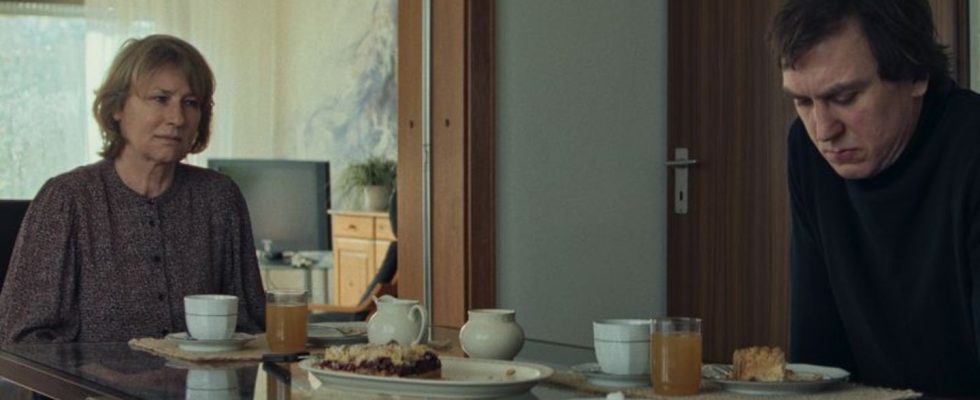drama
Ruthless: “Die” with Eidinger and Harfouch
Lissy Lunies (Corinna Harfouch) and her son Tom (Lars Eidinger) don’t have much to say to each other anymore. photo
© Jakub Bejnarowicz/Wildbunch/dpa
“Die” is considered one of the favorites for the German Film Prize. The drama tells an intense story about everyday life and the problems of a broken family – and features prominent actors.
He actually just wanted to make a little film about his mother, he said Matthias Glasner during the Berlinale. The result is a three-hour drama about almost all of life’s questions: In “Die”, director Glasner takes a close look at a broken family, so to speak. The merciless drama shines with German acting celebrities: Corinna Harfouch, Lars Eidinger, Lilith Stangenberg and Ronald Zehrfeld.
The title already gives it away: The film is not easy fare. Glasner (“Free Will”, “Grace”) also used it to process his own family history, as he told it at this year’s Berlinale. There, “Die” was shown in competition and was awarded the Silver Bear for the best screenplay. At the German Film Prize it is entered into the race with nine and therefore the most nominations. It has a chance at the award ceremony on May 3rd, among other things, in the “best feature film” category.
No warmth from the Lunies family
The starting point of the film is the death of father Gerd (Hans-Uwe Bauer), who suffers from dementia. This forces the members of the Lunies family to deal with each other again. Love, affection and warmth of heart are foreign words to them. The situation escalates when it becomes clear that the seriously ill mother (Harfouch) is also nearing the end of her life.
Glasner divides his film into several chapters and dedicates them to the family members. For example, there is the egocentric Tom (Eidinger), a conductor in Berlin. He works on an orchestral piece called “Die” with his depressed best friend Bernard (Robert Gwisdek). Tom’s sister Ellen (Stangenberg) struggles with excessive drinking and is involved with a dentist (Zehrfeld). Over the course of the film, the characters and their conflicts meet.
Glasner: “Film was born when my parents died”
Harfouch plays the aloof and cold mother Lissy particularly convincingly. She confesses to her son Tom at the kitchen table over coffee and cake that she could never love him and that he was an accident – on the day of her husband’s funeral. And Tom doesn’t really have anything to say to his mother anymore. This oppressive scene is one of the strongest and most intense moments in the film. Eidinger and Harfouch are nominated for the best male and female lead roles at the German Film Awards.
“The film was born at the moment when my parents died within a very short time (…) and my first daughter was born,” said Glasner at the Berlinale in February. He experienced some scenes one-on-one. He said about a film clip in a nursing home: “That was the last time I saw my father.” Nevertheless, he definitely didn’t want to make a film that would cause concern. “I wanted to tell all the sides of life that are part of it.”
In addition to the relationship with the (dying) parents, “Dying” also moves between fundamental topics such as birth and life itself, between intoxication, guilt, lust and depression. Glasner always manages to lighten up scenes with humor and absurd moments. The end result is a complex and worth seeing drama, even if it’s a bit too long in places.
Dying, Germany 2024, 180 min., by Matthias Glasner, with Corinna Harfouch and Lars Eidinger

